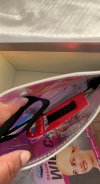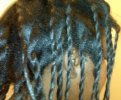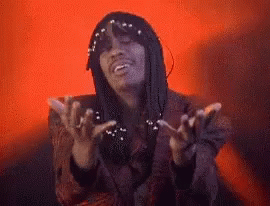MzSwift
Well-Known Member
Can we talk about relaxing processes?
I know we recommend ladies to use twists to make application easier but after watching some YT videos where ladies did twists,including the young lady from last night, I realized that they do a lot smaller twists than I do. I probably have 12 twists AT MOST when applying my relaxer. So when someone would ask me about when I take them down and how long it takes, I would get confused. lol. But the ladies in a few of the videos I watched last night had to stop and take out their twists bc they had so many and they were so small. Mine don't take any time to take out and I do it as I'm applying my 2nd round of neutralizing wash.
Because I texlax, I part my hair based on my need to keep the relaxer on as short a time as possible. So I'd rather spend more time smoothing than applying the relaxer. What I found was that I actually prefer to part my hair based on the different textures I have on my head, instead of even and straight parts, which results in less twists.
March 2019 was when I really started doing it, I only used 7 sections: My nape up to the top of my ears is a very silky and fine texture. Then my coarsest, most resistant parts are my crown, so I split that into 3 sections. The top/front of my head and temple areas are the most fragile parts and have a tendency to appear thin so I do one twist for each section. Of course, I started my application with the most resistant crown area and then my nape and finally my top, temples and the all around edges.
It only takes me 2 minutes to apply the relaxer (I pull out a twist and slather the relaxer on with my hands, don't beat me up, like the photo below). And that allows me to spend 5 minutes squeezing it in and smoothing it to my liking in the various areas. And then I immediately go rinse in the backwards order that I relaxed. Overall about 8-10 minutes from start to rinse.
My sections
See how big I make my back section. Even when I part down the middle, my back section is still big. For my winter relaxers, I part down the middle. For my spring relaxers, I don't prefer to part down the middle bc it seems to make my results too straight. I'm not sure why.
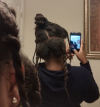
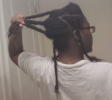
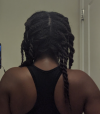
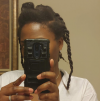
Applied and smoothed
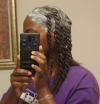
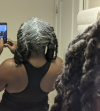
My results
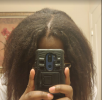
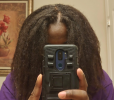
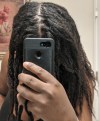
For the ladies who twist, about how many twists do you use to apply? And how long does it take you to relax from start to rinse? Also, how long does it take you to take out the twists?
I know we recommend ladies to use twists to make application easier but after watching some YT videos where ladies did twists,including the young lady from last night, I realized that they do a lot smaller twists than I do. I probably have 12 twists AT MOST when applying my relaxer. So when someone would ask me about when I take them down and how long it takes, I would get confused. lol. But the ladies in a few of the videos I watched last night had to stop and take out their twists bc they had so many and they were so small. Mine don't take any time to take out and I do it as I'm applying my 2nd round of neutralizing wash.
Because I texlax, I part my hair based on my need to keep the relaxer on as short a time as possible. So I'd rather spend more time smoothing than applying the relaxer. What I found was that I actually prefer to part my hair based on the different textures I have on my head, instead of even and straight parts, which results in less twists.
March 2019 was when I really started doing it, I only used 7 sections: My nape up to the top of my ears is a very silky and fine texture. Then my coarsest, most resistant parts are my crown, so I split that into 3 sections. The top/front of my head and temple areas are the most fragile parts and have a tendency to appear thin so I do one twist for each section. Of course, I started my application with the most resistant crown area and then my nape and finally my top, temples and the all around edges.
It only takes me 2 minutes to apply the relaxer (I pull out a twist and slather the relaxer on with my hands, don't beat me up, like the photo below). And that allows me to spend 5 minutes squeezing it in and smoothing it to my liking in the various areas. And then I immediately go rinse in the backwards order that I relaxed. Overall about 8-10 minutes from start to rinse.
My sections
See how big I make my back section. Even when I part down the middle, my back section is still big. For my winter relaxers, I part down the middle. For my spring relaxers, I don't prefer to part down the middle bc it seems to make my results too straight. I'm not sure why.




Applied and smoothed


My results



For the ladies who twist, about how many twists do you use to apply? And how long does it take you to relax from start to rinse? Also, how long does it take you to take out the twists?

 and I immediately added 20 drops to my herbal braid spray tea.
and I immediately added 20 drops to my herbal braid spray tea. 



